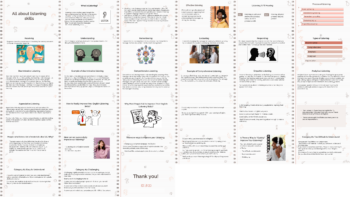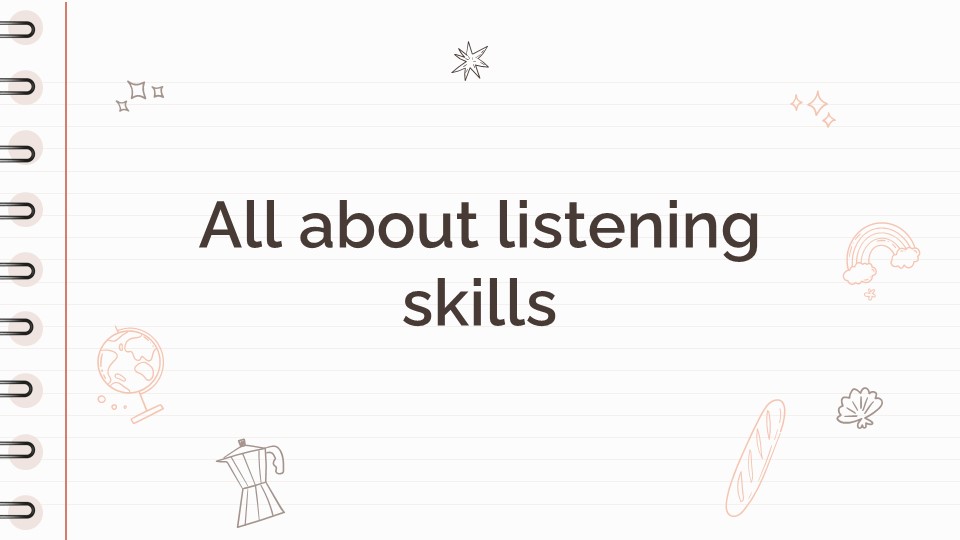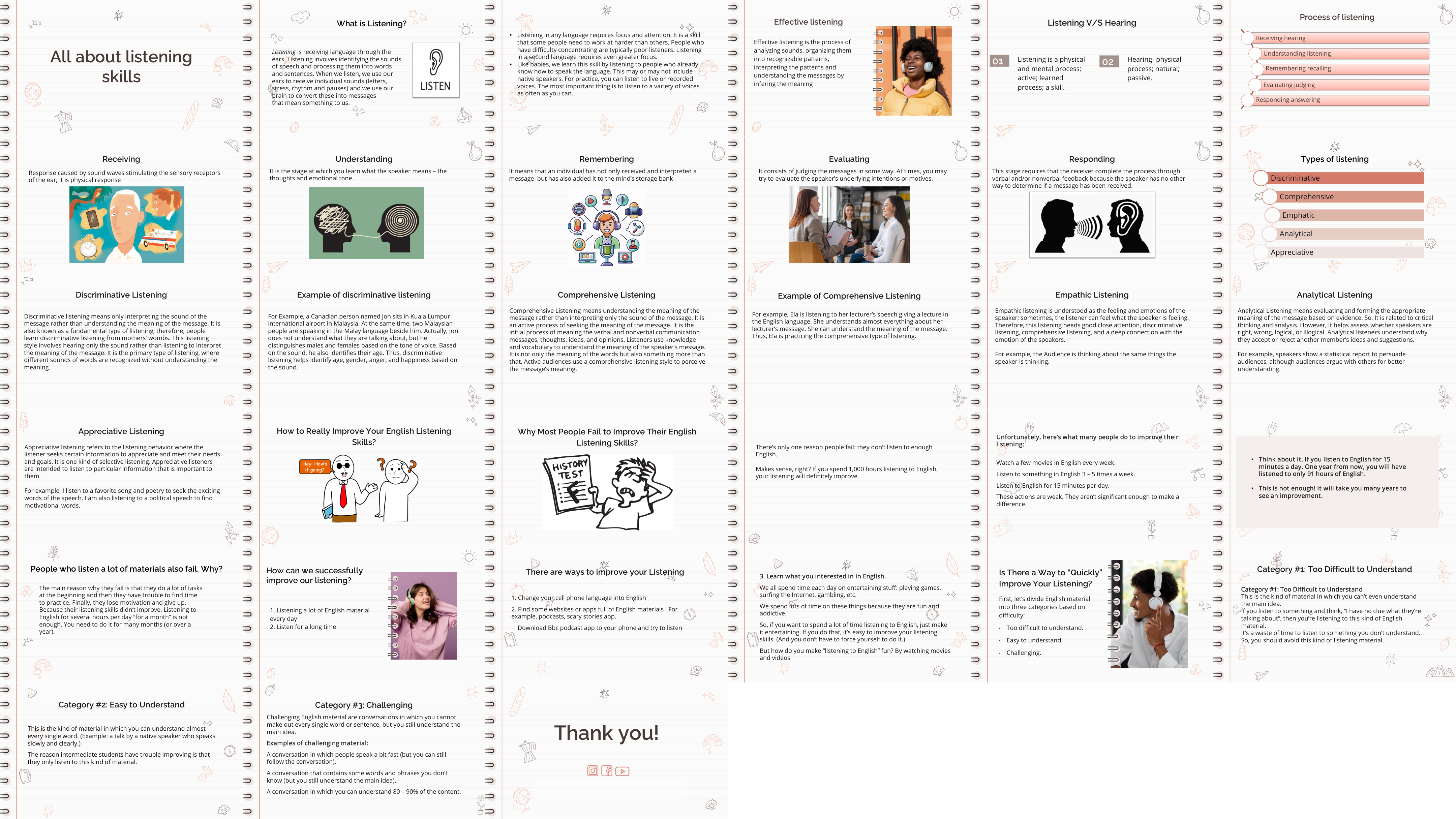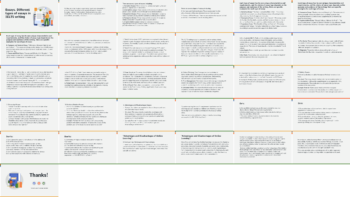ALL ABOUT LISTENING SKILLS
9000 so'm

ALL ABOUT LISTENING SKILLS
All About Listening Skills
Listening skills — bu til o‘rganishning eng muhim va ko‘p e’tibor talab qiladigan ko‘nikmalaridan biridir. Tinglash — bu nafaqat tovushlarni eshitish, balki ularni anglash, tahlil qilish va ma’nosini tushunish jarayonidir. Ingliz tilini o‘rganishda samarali tinglash ko‘nikmasini shakllantirish nutqni tushunish va muloqot qilishni osonlashtiradi.
What is Listening?
Listening is the process of receiving language through the ears. It involves identifying speech sounds and processing them into words and sentences. While listening, we use our ears to capture sounds (stress, rhythm, pauses) and our brain to convert these sounds into meaningful messages.
Listening vs Hearing
Hearing — bu tabiiy, passiv jarayon; tovushni eshitish.
Listening esa faol va o‘rganilgan jarayon bo‘lib, tinglovchi diqqatini jamlab, eshitilgan ma’lumotni anglaydi va tahlil qiladi. Shuning uchun “listening” bu eshitishdan yuqori darajadagi ko‘nikma sanaladi.
The Process of Listening
Tinglash besh asosiy bosqichdan iborat:
- Receiving — tovushni eshitish jarayoni, bu fiziologik reaksiya hisoblanadi.
- Understanding — tinglovchi ma’noni, ohangni va his-tuyg‘ularni tushunadi.
- Remembering — eshitilgan ma’lumotni xotirada saqlash bosqichi.
- Evaluating — tinglovchi xabarni tahlil qiladi, gapiruvchining niyatini baholaydi.
- Responding — javob berish (og‘zaki yoki imo-ishora bilan) orqali aloqa yakunlanadi.
Types of Listening
Listening skills turli maqsadlarda qo‘llaniladi. Quyida uning asosiy turlari keltirilgan:
- Discriminative Listening — tovushlarni farqlash, lekin ma’nosini tushunmaslik. Masalan, tinglovchi ovozdan jins yoki yoshni aniqlay oladi.
- Comprehensive Listening — xabar ma’nosini tushunish, so‘z boyligi va kontekst orqali fikrni anglash.
- Empathic Listening — gapiruvchining his-tuyg‘ularini tushunish, hissiy aloqada bo‘lish.
- Analytical Listening — eshitilgan ma’lumotni tahlil qilish va mantiqiy baholash.
- Appreciative Listening — musiqa, she’r yoki nutqdan zavq olish uchun tinglash.
How to Improve Your English Listening Skills
Ko‘pchilikning tinglash ko‘nikmasi rivojlanmaydi, sababi ular yetarlicha inglizcha eshitmaydi. 15 daqiqa kuniga yetarli emas — bu bir yil davomida atigi 91 soatni tashkil etadi. Samara ko‘rish uchun esa minglab soatlar kerak.
Successful Listening Practice
Quyidagi usullar orqali listening skillsni samarali rivojlantirish mumkin:
- Har kuni inglizcha audio va videolarni ko‘p tinglash;
- Tinglash davomiyligini oshirish (bir necha soatlab tinglash);
- Telefon tilini ingliz tiliga o‘zgartirish;
- BBC podcast, YouTube, yoki audio hikoyalar orqali tinglashni odatga aylantirish;
- O‘zingizni qiziqtirgan mavzularni ingliz tilida tinglash — filmlar, o‘yinlar, bloglar.
Levels of Listening Materials
Listening materiallarini murakkablik darajasiga ko‘ra uch turga bo‘lish mumkin:
- Too Difficult: Asosiy fikr ham tushunilmaydigan darajadagi material. Bunday audio foydasiz.
- Easy: Juda oson materiallar, deyarli barcha so‘zlar tushunarli. O‘rta darajadagilar uchun bu sekin rivoj beradi.
- Challenging: 80–90% tushunarli, ammo yangi so‘zlar bor — rivojlanish uchun eng samarali daraja.
Conclusion
Listening skills — bu eshitish, tushunish, xotirada saqlash, tahlil qilish va javob qaytarishdan iborat faol jarayon. Uni rivojlantirish uchun muntazam mashq, sabr va qiziqarli materiallar zarur. Esda tuting: qancha ko‘p tinglasangiz, shuncha tez rivojlanasiz!
=== Taqdimot 1 ===
All about listening skills
=== Taqdimot 2 ===
What is Listening?
Listening is receiving language through the ears. Listening involves identifying the sounds of speech and processing them into words and sentences. When we listen, we use our ears to receive individual sounds (letters, stress, rhythm and pauses) and we use our brain to convert these into messages that mean something to us.
=== Taqdimot 3 ===
Listening in any language requires focus and attention. It is a skill that some people need to work at harder than others. People who have difficulty concentrating are typically poor listeners. Listening in a second language requires even greater focus.
Like babies, we learn this skill by listening to people who already know how to speak the language. This may or may not include native speakers. For practice, you can listen to live or recorded voices. The most important thing is to listen to a variety of voices as often as you can.
=== Taqdimot 4 ===
Effective listening
Effective listening is the process of analyzing sounds, organizing them into recognizable patterns, interpreting the patterns and understanding the messages by infering the meaning
=== Taqdimot 5 ===
Hearing- physical process; natural; passive.
Listening is a physical and mental process; active; learned process; a skill.
01
02
Listening V/S Hearing
=== Taqdimot 6 ===
Process of listening
=== Taqdimot 7 ===
Receiving
Response caused by sound waves stimulating the sensory receptors of the ear; it is physical response
=== Taqdimot 8 ===
Understanding
It is the stage at which you learn what the speaker means – the thoughts and emotional tone.
=== Taqdimot 9 ===
Remembering
It means that an individual has not only received and interpreted a message but has also added it to the mind’s storage bank
=== Taqdimot 10 ===
Evaluating
It consists of judging the messages in some way. At times, you may try to evaluate the speaker’s underlying intentions or motives.
=== Taqdimot 11 ===
Responding
This stage requires that the receiver complete the process through verbal and/or nonverbal feedback because the speaker has no other way to determine if a message has been received.
=== Taqdimot 12 ===
Types of listening
=== Taqdimot 13 ===
Discriminative Listening
Discriminative listening means only interpreting the sound of the message rather than understanding the meaning of the message. It is also known as a fundamental type of listening; therefore, people learn discriminative listening from mothers’ wombs. This listening style involves hearing only the sound rather than listening to interpret the meaning of the message. It is the primary type of listening, where different sounds of words are recognized without understanding the meaning.
=== Taqdimot 14 ===
Example of discriminative listening
For Example, a Canadian person named Jon sits in Kuala Lumpur international airport in Malaysia. At the same time, two Malaysian people are speaking in the Malay language beside him. Actually, Jon does not understand what they are talking about, but he distinguishes males and females based on the tone of voice. Based on the sound, he also identifies their age. Thus, discriminative listening helps identify age, gender, anger, and happiness based on the sound.
=== Taqdimot 15 ===
Comprehensive Listening
Comprehensive Listening means understanding the meaning of the message rather than interpreting only the sound of the message. It is an active process of seeking the meaning of the message. It is the initial process of meaning the verbal and nonverbal communication messages, thoughts, ideas, and opinions. Listeners use knowledge and vocabulary to understand the meaning of the speaker’s message. It is not only the meaning of the words but also something more than that. Active audiences use a comprehensive listening style to perceive the message’s meaning.
=== Taqdimot 16 ===
Example of Comprehensive Listening
For example, Ela is listening to her lecturer’s speech giving a lecture in the English language. She understands almost everything about her lecturer’s message. She can understand the meaning of the message. Thus, Ela is practicing the comprehensive type of listening.
=== Taqdimot 17 ===
Empathic Listening
Empathic listening is understood as the feeling and emotions of the speaker; sometimes, the listener can feel what the speaker is feeling. Therefore, this listening needs good close attention, discriminative listening, comprehensive listening, and a deep connection with the emotion of the speakers.
For example, the Audience is thinking about the same things the speaker is thinking.
=== Taqdimot 18 ===
Analytical Listening
Analytical Listening means evaluating and forming the appropriate meaning of the message based on evidence. So, It is related to critical thinking and analysis. However, It helps assess whether speakers are right, wrong, logical, or illogical. Analytical listeners understand why they accept or reject another member’s ideas and suggestions.
For example, speakers show a statistical report to persuade audiences, although audiences argue with others for better understanding.
=== Taqdimot 19 ===
Appreciative Listening
Appreciative listening refers to the listening behavior where the listener seeks certain information to appreciate and meet their needs and goals. It is one kind of selective listening. Appreciative listeners are intended to listen to particular information that is important to them.
For example, I listen to a favorite song and poetry to seek the exciting words of the speech. I am also listening to a political speech to find motivational words.
=== Taqdimot 20 ===
How to Really Improve Your English Listening Skills?
=== Taqdimot 21 ===
Why Most People Fail to Improve Their English Listening Skills?
=== Taqdimot 22 ===
There’s only one reason people fail: they don’t listen to enough English.
Makes sense, right? If you spend 1,000 hours listening to English, your listening will definitely improve.
=== Taqdimot 23 ===
Unfortunately, here’s what many people do to improve their listening:
Watch a few movies in English every week.
Listen to something in English 3 – 5 times a week.
Listen to English for 15 minutes per day.
These actions are weak. They aren’t significant enough to make a difference.
=== Taqdimot 24 ===
Think about it. If you listen to English for 15 minutes a day. One year from now, you will have listened to only 91 hours of English.
This is not enough! It will take you many years to see an improvement.
=== Taqdimot 25 ===
People who listen a lot of materials also fail, Why?
The main reason why they fail is that they do a lot of tasks at the beginning and then they have trouble to find time to practice. Finally, they lose motivation and give up. Because their listening skills didn’t improve. Listening to English for several hours per day “for a month” is not enough. You need to do it for many months (or over a year).
=== Taqdimot 26 ===
How can we successfully improve our listening?
1. Listening a lot of English material every day
2. Listen for a long time
=== Taqdimot 27 ===
There are ways to improve your Listening
1. Change your cell phone language into English
2. Find some websites or apps full of English materials . For example, podcasts, scary stories app.
Download Bbc podcast app to your phone and try to listen
=== Taqdimot 28 ===
3. Learn what you interested in in English.
We all spend time each day on entertaining stuff: playing games, surfing the Internet, gambling, etc.
We spend lots of time on these things because they are fun and addictive.
So, if you want to spend a lot of time listening to English, just make it entertaining. If you do that, it’s easy to improve your listening skills. (And you don’t have to force yourself to do it.)
But how do you make “listening to English” fun? By watching movies and videos
=== Taqdimot 29 ===
Is There a Way to “Quickly” Improve Your Listening?
First, let’s divide English material into three categories based on difficulty:
Too difficult to understand.
Easy to understand.
Challenging.
=== Taqdimot 30 ===
Category #1: Too Difficult to Understand
Category #1: Too Difficult to Understand
This is the kind of material in which you can’t even understand the main idea.
If you listen to something and think, “I have no clue what they’re talking about”, then you’re listening to this kind of English material.
It’s a waste of time to listen to something you don’t understand. So, you should avoid this kind of listening material.
=== Taqdimot 31 ===
Category #2: Easy to Understand
This is the kind of material in which you can understand almost every single word. (Example: a talk by a native speaker who speaks slowly and clearly.)
The reason intermediate students have trouble improving is that they only listen to this kind of material.
=== Taqdimot 32 ===
Category #3: Challenging
Сhallenging English material are conversations in which you cannot make out every single word or sentence, but you still understand the main idea.
Examples of challenging material:
A conversation in which people speak a bit fast (but you can still follow the conversation).
A conversation that contains some words and phrases you don’t know (but you still understand the main idea).
A conversation in which you can understand 80 – 90% of the content.
=== Taqdimot 33 ===
Thank you!
📘 “All about Listening Skills” mavzusidagi to‘liq taqdimotni Slaydchi.uz saytida tomosha qiling.
Slaydchi.uz — ingliz tili, tarix, metodika va pedagogika bo‘yicha taqdimotlar uchun vizual platforma.
Boshqa darslar uchun: slaydchi.uz
| 5 |
|
0 |
| 4 |
|
0 |
| 3 |
|
0 |
| 2 |
|
0 |
| 1 |
|
0 |





























Sharhlar
Hali sharhlar mavjud emas.